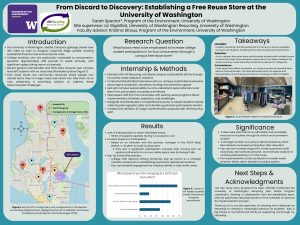From Discard to Discovery: Establishing a Free Reuse Store at the University of Washington
The University of Washington Seattle’s waste management system currently transports garbage over 300 miles to the Columbia Ridge Landfill in Oregon, creating significant environmental impacts and financial costs. Simultaneously, students struggle to access affordable goods near campus due to limited options following the closure of multiple general merchandise stores nearby. Consequently, students are often forced to lean towards unsustainable options like Amazon or other online retailers. This paper proposes a free reuse store at the University of Washington, Seattle, creating a circular economy that diverts usable items from the waste stream. Therefore, it can provide students with no-cost alternatives to deter participation in consumerism. To develop a free reuse store proposal, my co-intern and I interviewed college staff nationwide who have successfully implemented similar reuse spaces. We also distributed surveys to assess campus needs and potential participation. Our survey of 129 University of Washington students revealed overwhelmingly positive interest in a free reuse store, with a high willingness to participate based on existing donation habits. Students particularly valued the potential environmental benefits and the opportunity to access free household items, clothing, and school supplies. Staff interviews at other institutions provided valuable insights on space requirements, staffing needs, collection systems, and operational logistics that guided our proposal development. The interviews conducted revealed important information, such as that successful campus reuse stores typically operate with a combination of staff and student volunteers. In addition, they informed us of the importance of strategic partnerships with housing, facilities, and sustainability departments. The proposed free reuse store initiative would reduce UW Seattle’s environmental footprint by cutting waste transportation costs while providing students with sustainable, free alternatives that promote participation in environmental stewardship.
